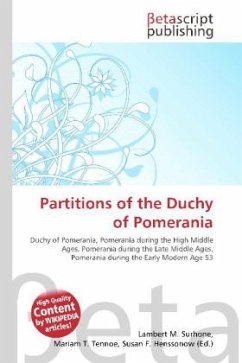Please note that the content of this book primarily consists of articles available from Wikipedia or other free sources online. The Duchy of Pomerania was partitioned several times to satisfy the claims of the male members of the ruling House of Pomerania dynasty. The partitions were named after the ducal residences: Pomerania-Barth, -Demmin, -Rügenwalde, -Stettin, -Stolp, and -Wolgast. None of the partitions had a hereditary character, the members of the House of Pomerania inherited the duchy in common. The duchy thus continued to exist as a whole despite its division. The only exception was made during a war with the Margraviate of Brandenburg, when in 1338 Barnim III of Pomerania-Stettin was granted his partition as a fief directly from the Holy Roman Emperor, while Pomerania-Wolgast remained under formal Brandenburgian overlordship. However, already in 1348, German king and later emperor Karl IV again granted the Duchy of Pomerania as a whole and the Principality of Rügen as a fief to the dukes of both Pomerania-Stettin and Pomerania-Wolgast, erasing Brandenburg''s claims by granting Imperial immediacy.
Bitte wählen Sie Ihr Anliegen aus.
Rechnungen
Retourenschein anfordern
Bestellstatus
Storno








